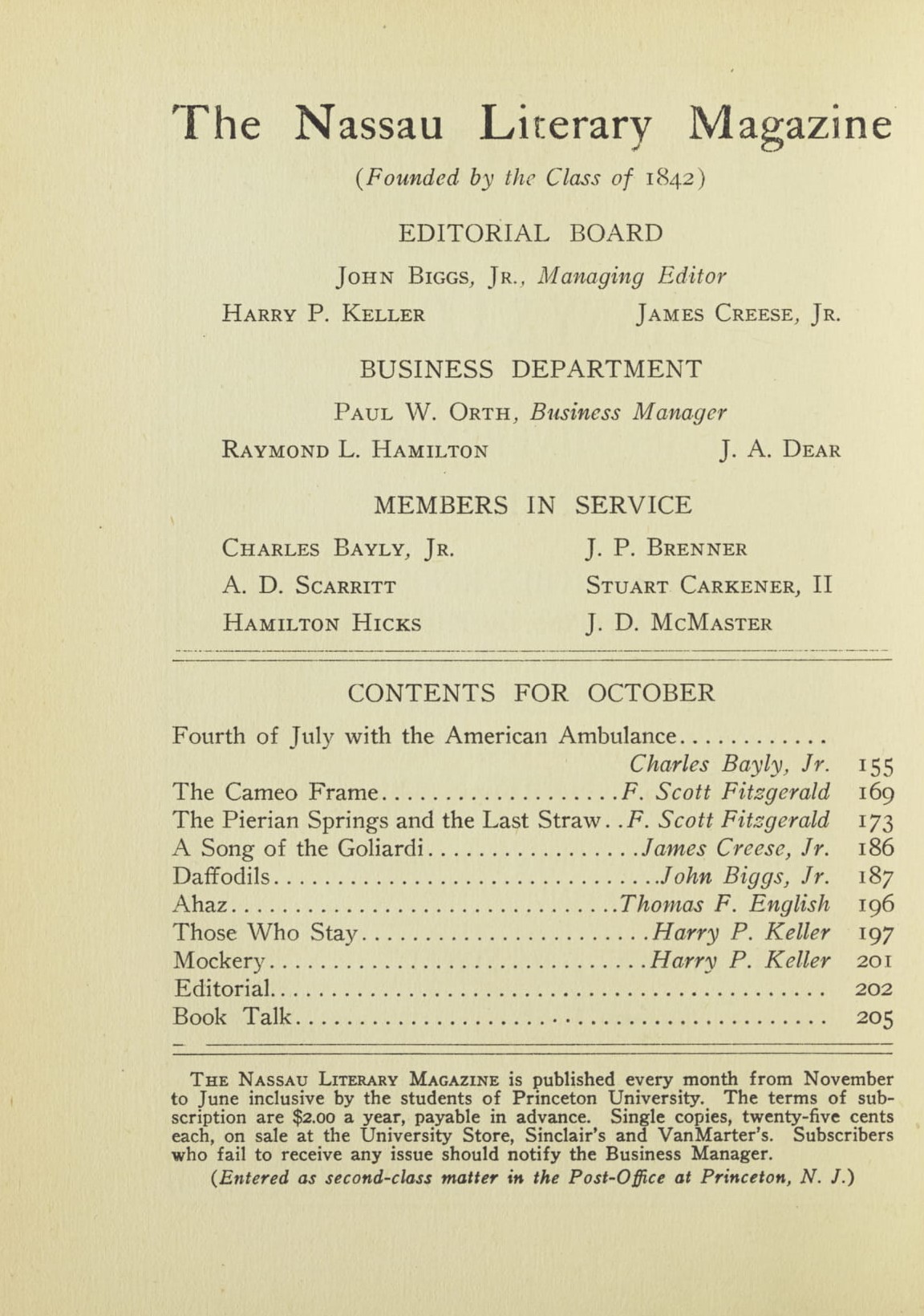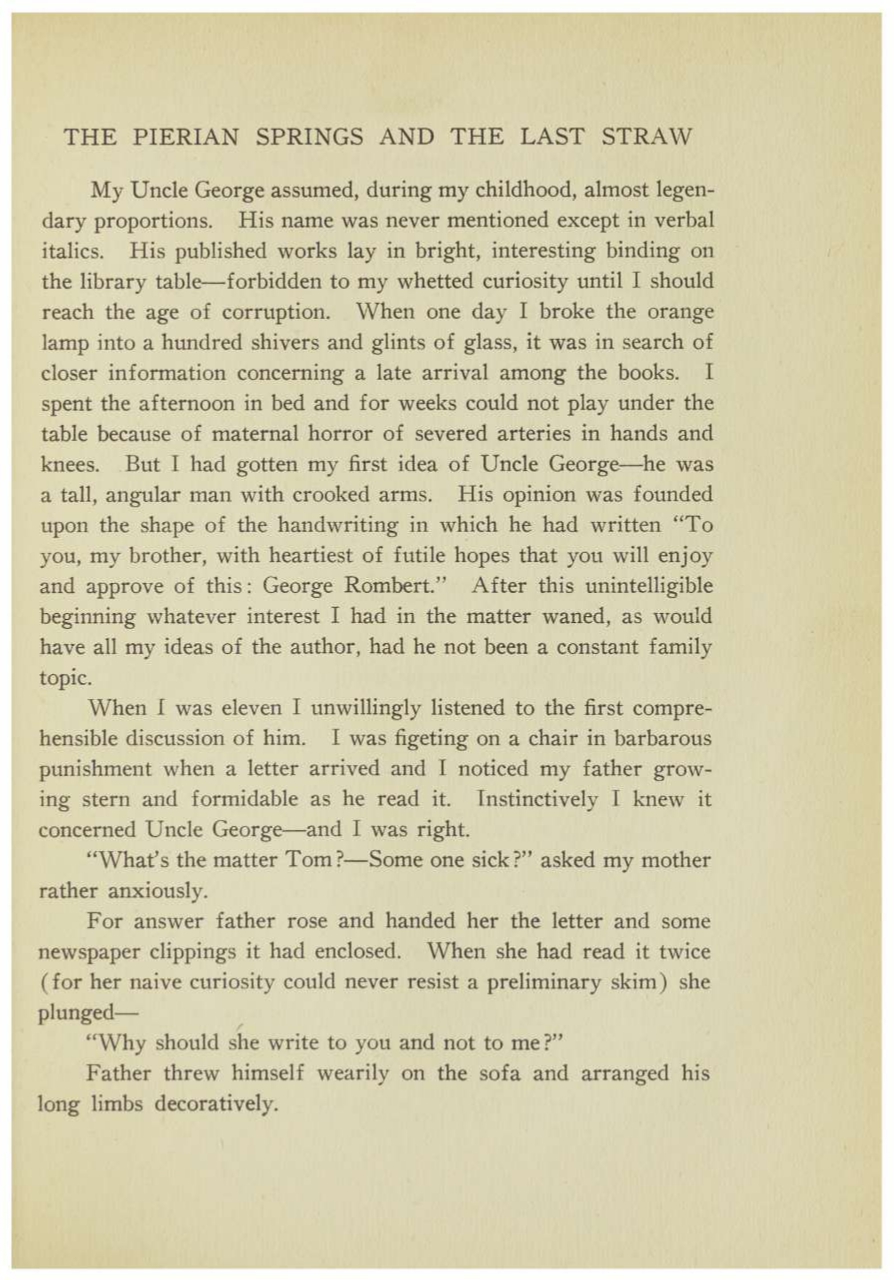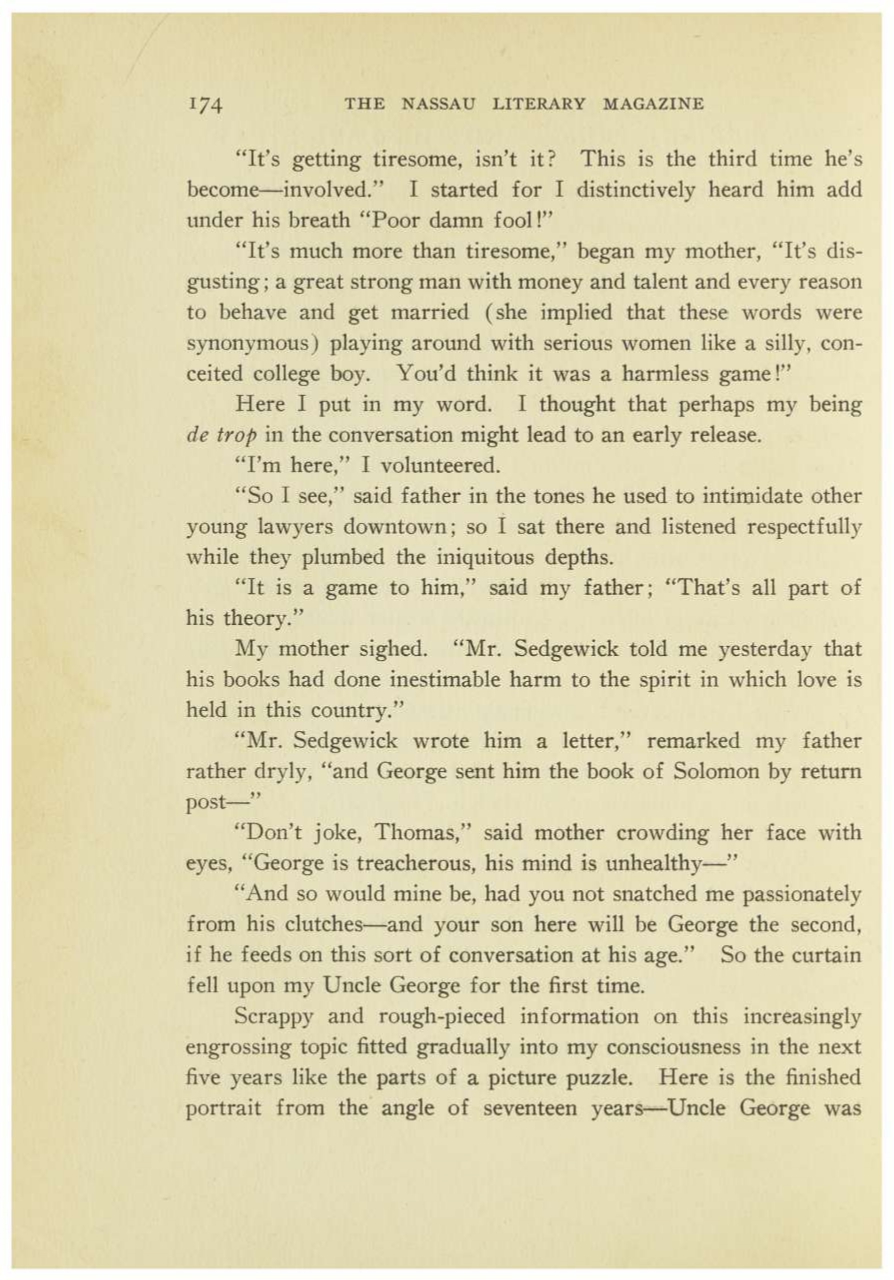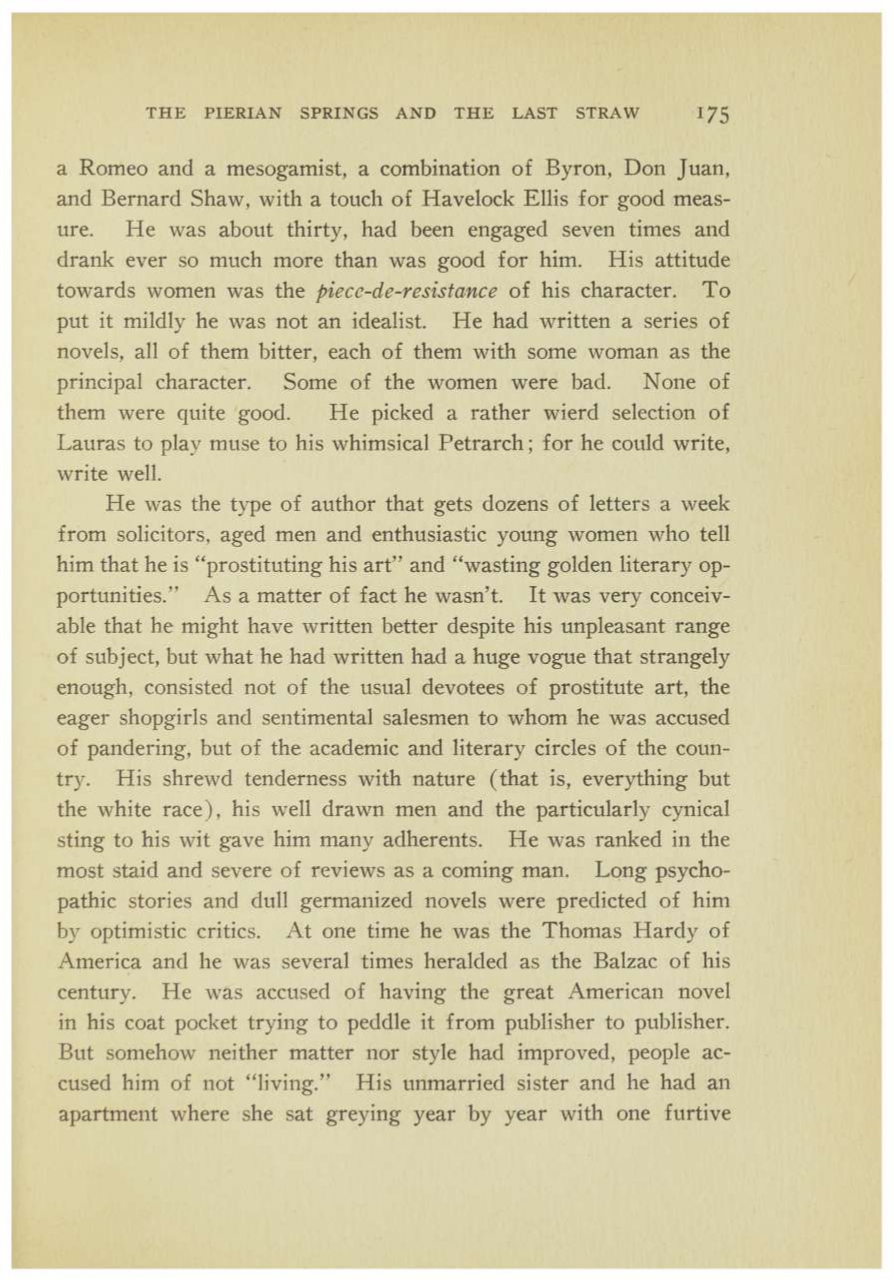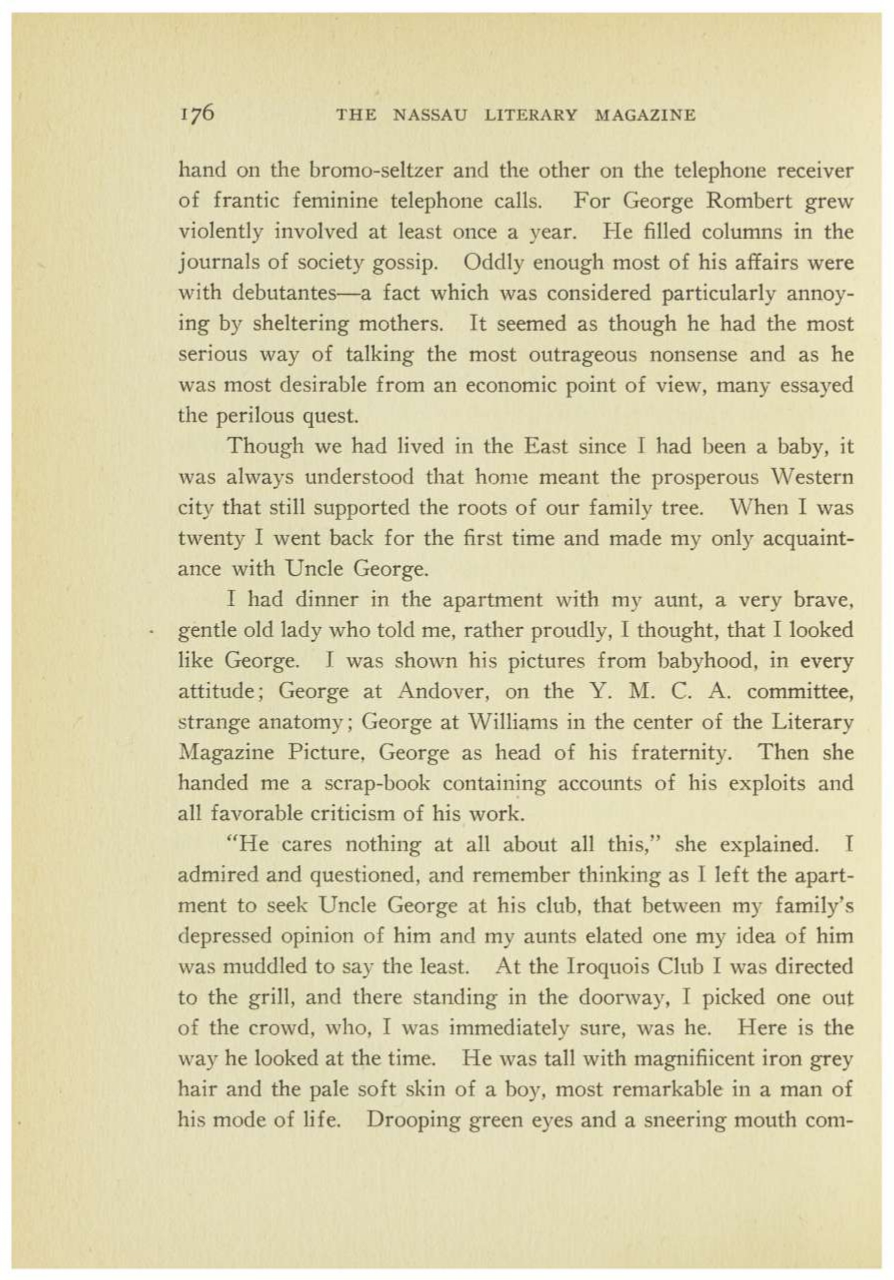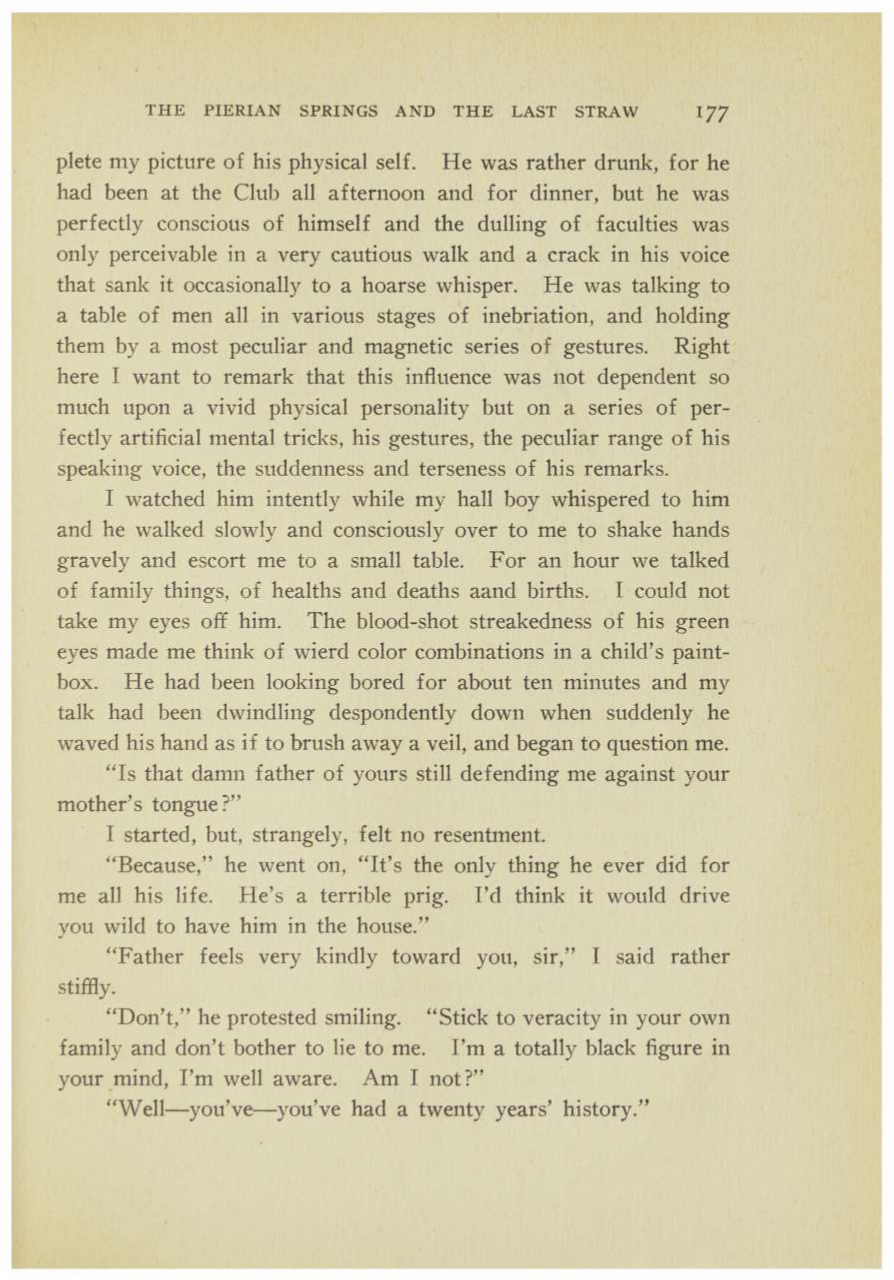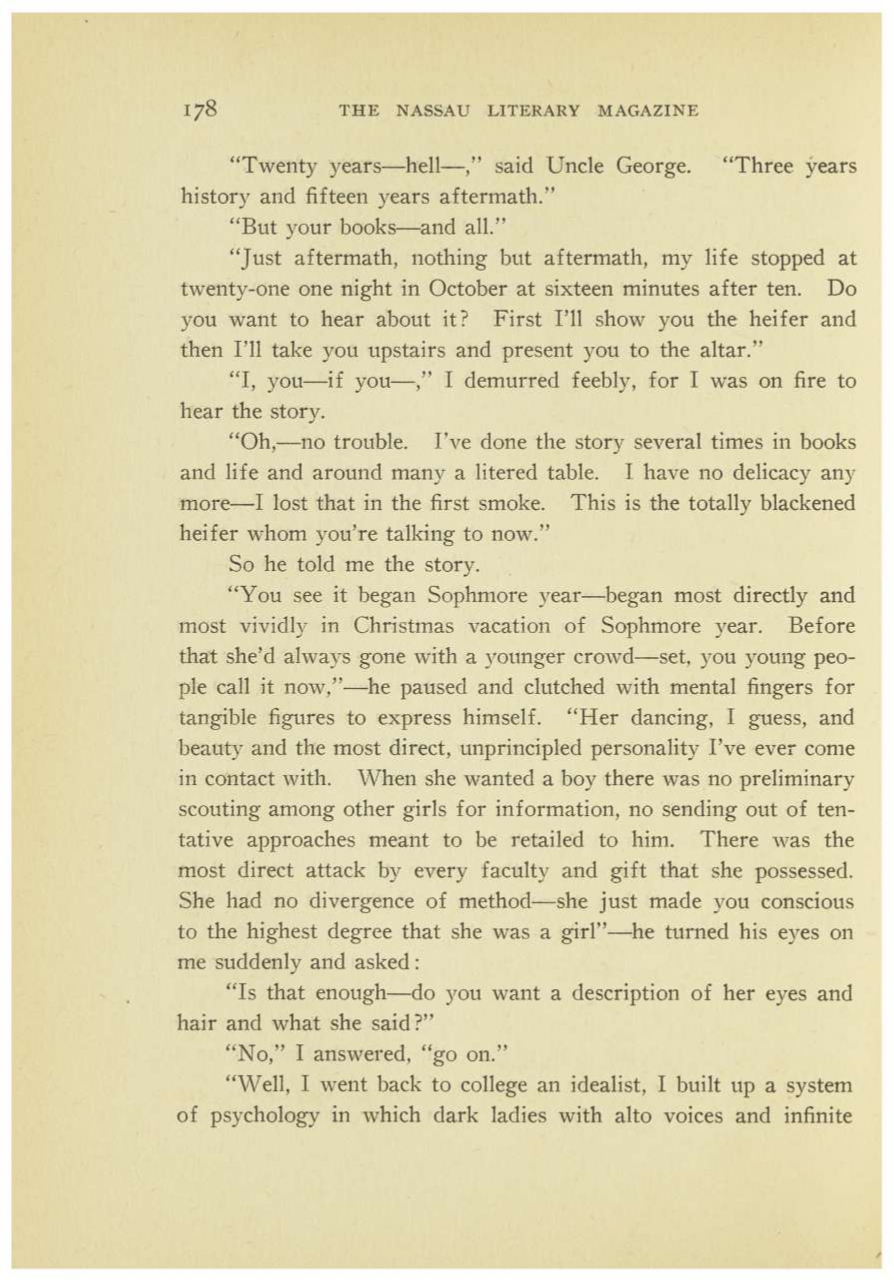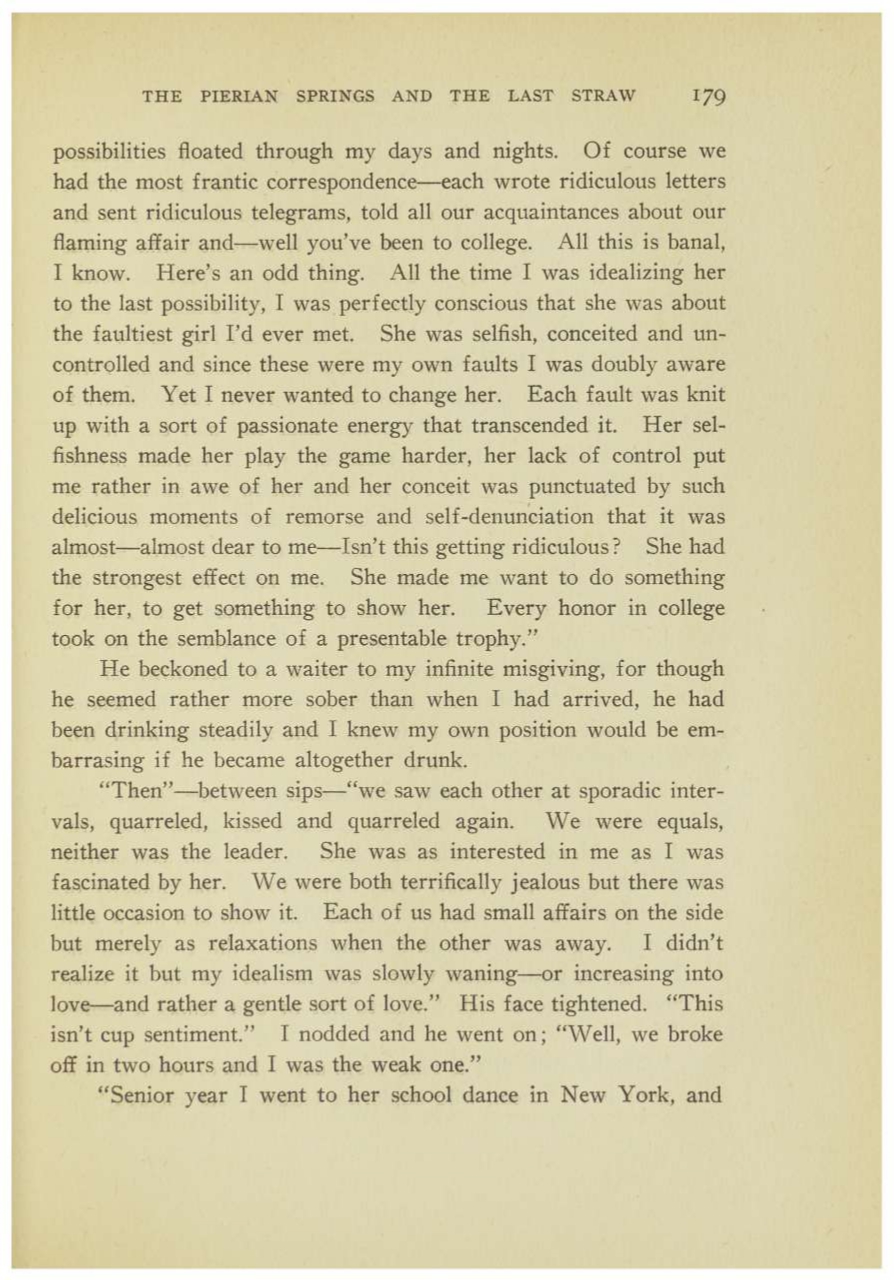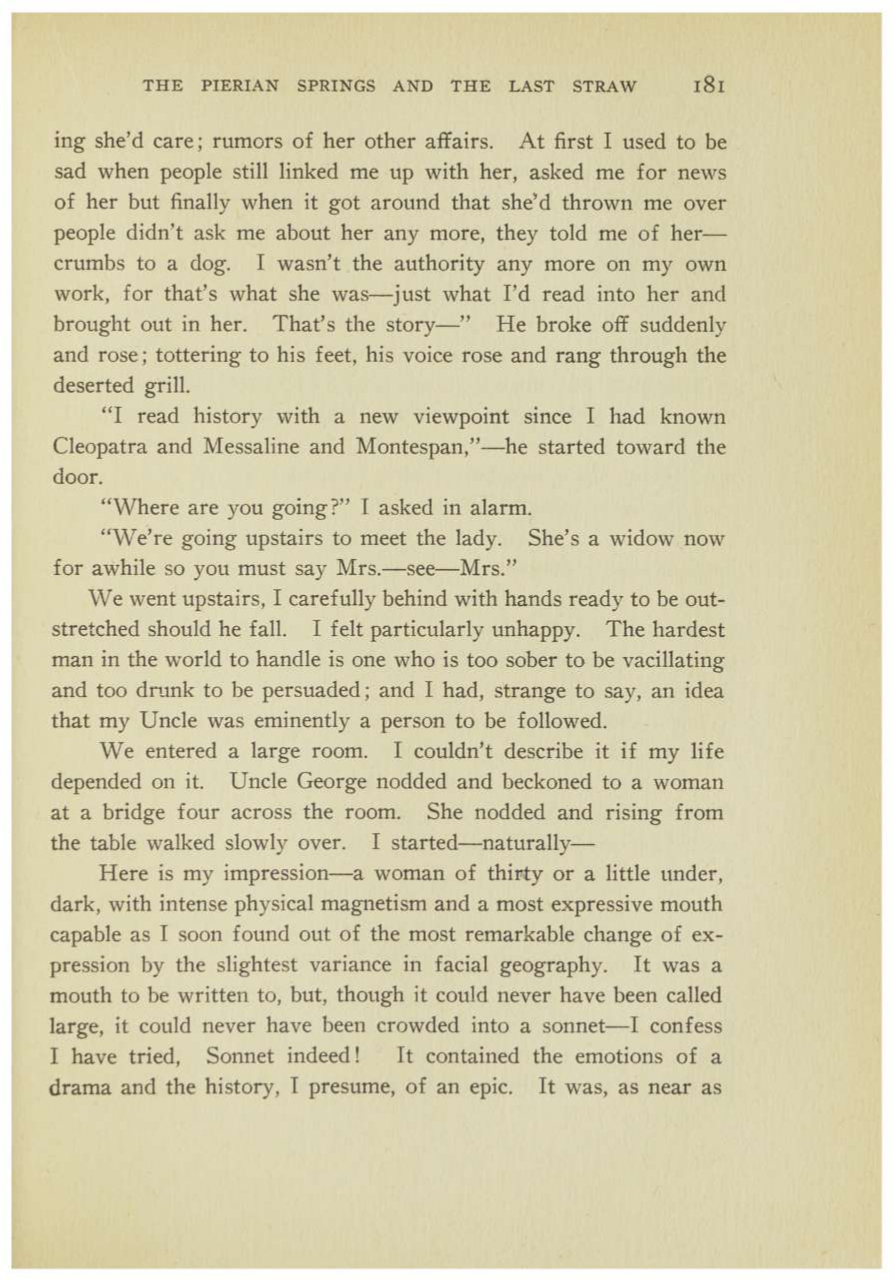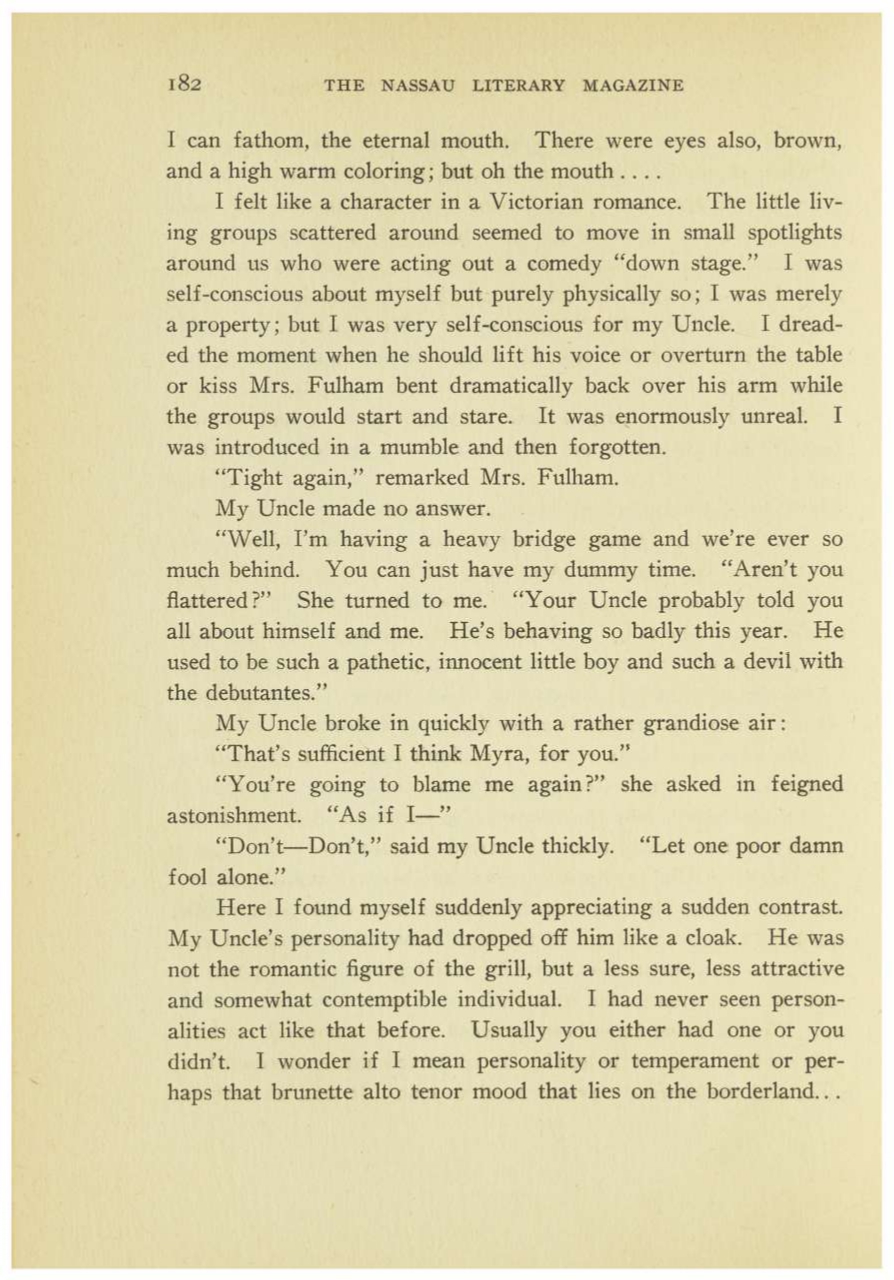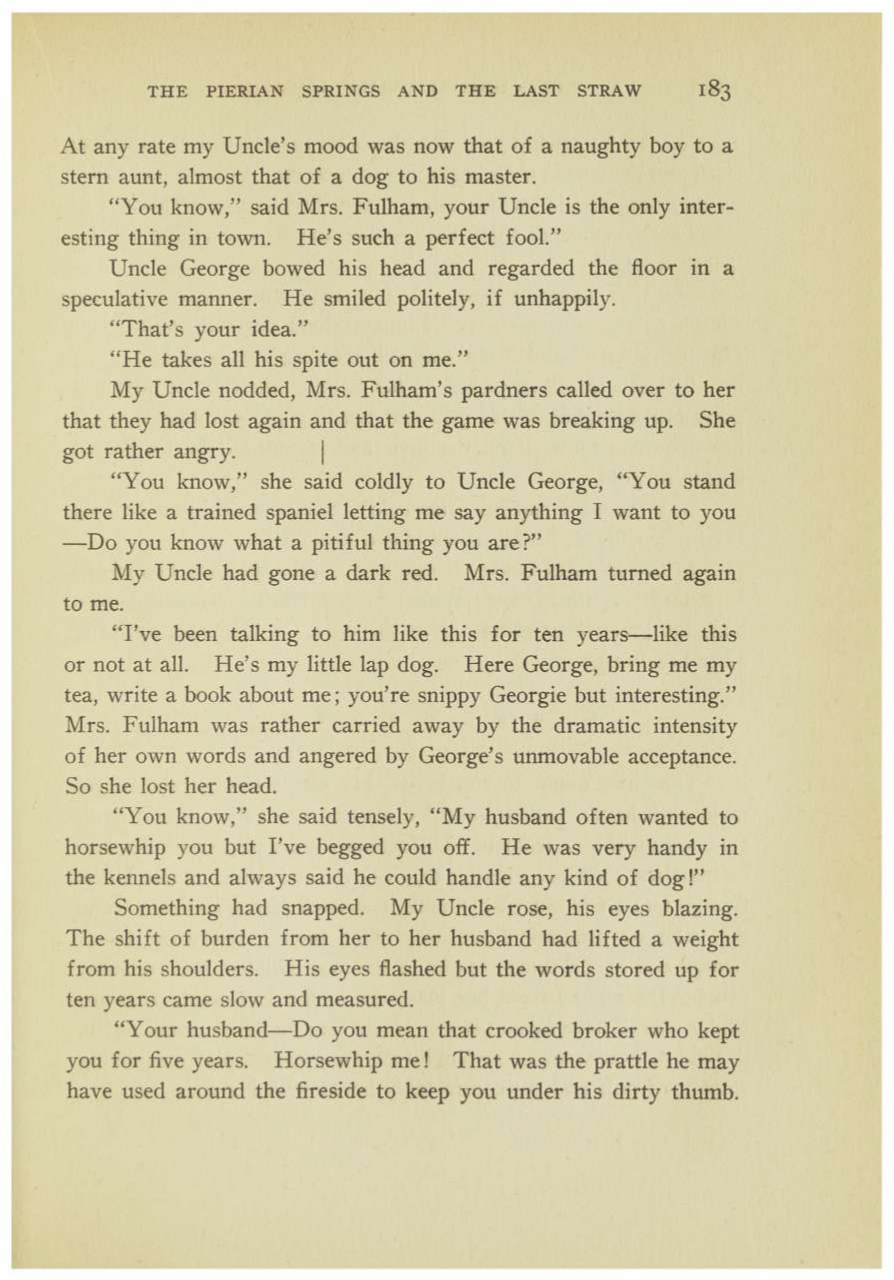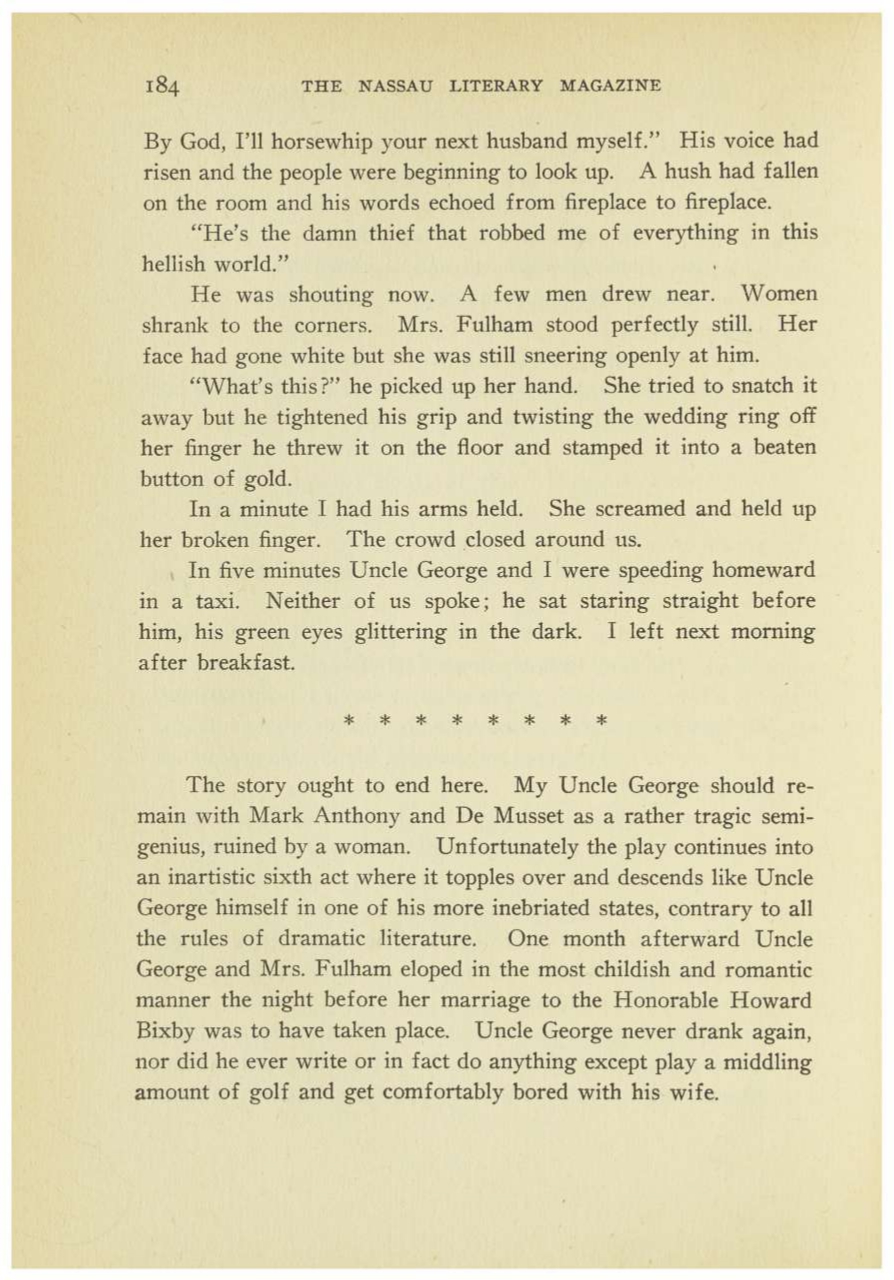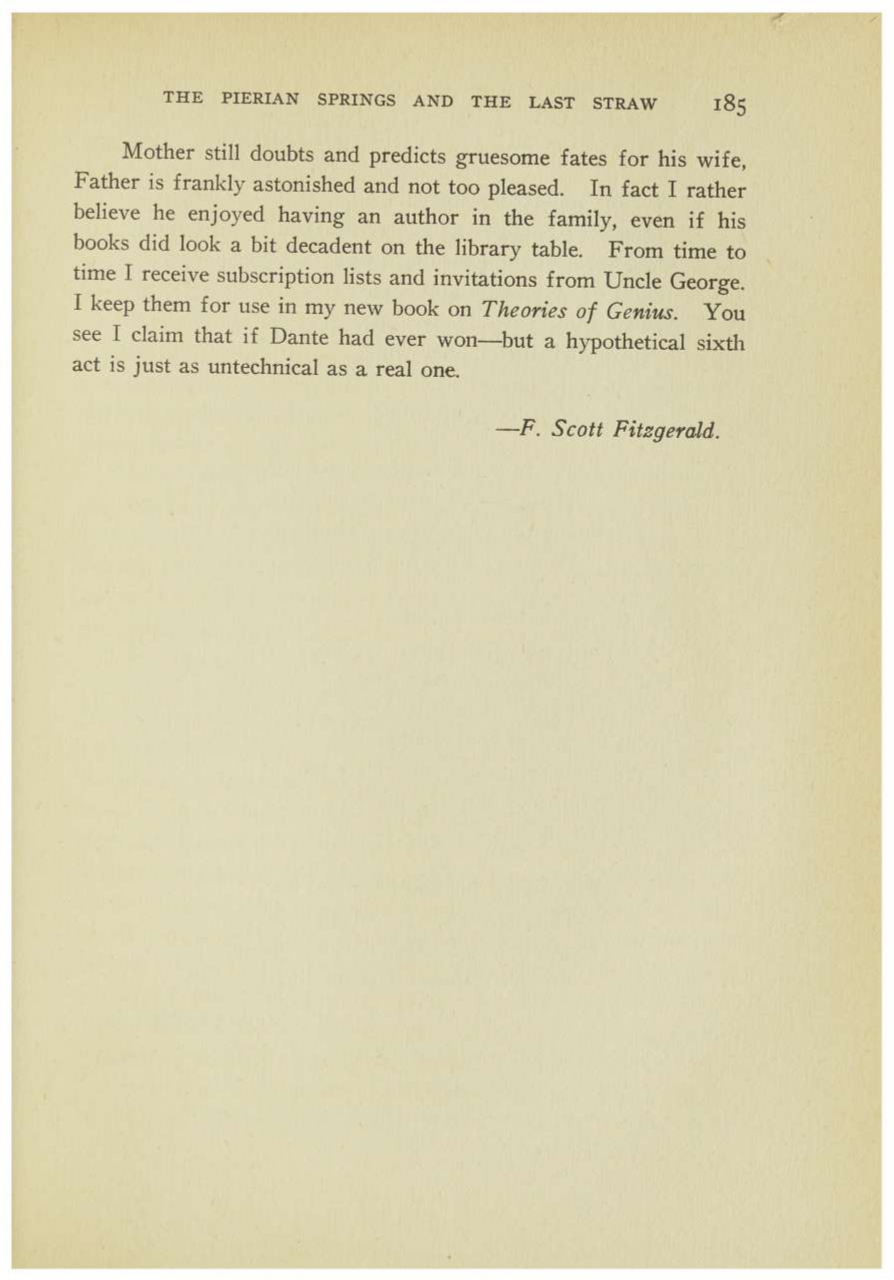
The Pierian Springs and the Last Straw
by F. Scott Fitzgerald
My Uncle George assumed, during my childhood, almost legendary proportions. His name was never mentioned except in verbal italics. His published works lay in bright, interesting binding on the library table—forbidden to my whetted curiosity until I should reach the age of corruption. When one day I broke the orange lamp into a hundred shivers and glints of glass, it was in search of closer information concerning a late arrival among the books. I spent the afternoon in bed and for weeks could not play under the table because of maternal horror of severed arteries in hands and knees. But I had gotten my first idea of Uncle George—he was a tall, angular man with crooked arms. His opinion was founded upon the shape of the handwriting in which he had written “To you, my brother, with heartiest of futile hopes that you will enjoy and approve of this: George Rombert.” After this unintelligible beginning whatever interest I had in the matter waned, as would have all my ideas of the author, had he not been a constant family topic.
When I was eleven I unwillingly listened to the first comprehensible discussion of him. I was figeting on a chair in barbarous punishment when a letter arrived and I noticed my father growing stern and formidable as he read it. Instinctively I knew it concerned Uncle George—and I was right.
“What’s the matter Tom?—Some one sick?” asked my mother rather anxiously.
For answer father rose and handed her the letter and some newspaper clippings it had enclosed. When she had read it twice (for her naive curiosity could never resist a preliminary skim) she plunged—
“Why should she write to you and not to me?”
Father threw himself wearily on the sofa and arranged his long limbs decoratively.
“It’s getting tiresome, isn’t it? This is the third time he’s become—involved.” I started for I distinctively heard him add under his breath “Poor damn fool!”
“It’s much more than tiresome,” began my mother, “It’s disgusting; a great strong man with money and talent and every reason to behave and get married (she implied that these words were synonymous) playing around with serious women like a silly, conceited college boy. You’d think it was a harmless game!”
Here I put in my word. I thought that perhaps my being de trop in the conversation might lead to an early release.
“I’m here,” I volunteered.
“So I see,” said father in the tones he used to intimidate other young lawyers downtown; so I sat there and listened respectfully while they plumbed the iniquitous depths.
“It is a game to him,” said my father; “That’s all part of his theory.”
My mother sighed. “Mr. Sedgewick told me yesterday that his books had done inestimable harm to the spirit in which love is held in this country.”
“Mr. Sedgewick wrote him a letter,” remarked my father rather dryly, “and George sent him the book of Solomon by return post—”
“Don’t joke, Thomas,” said mother crowding her face with eyes, “George is treacherous, his mind is unhealthy—”
“And so would mine be, had you not snatched me passionately from his clutches—and your son here will be George the second, if he feeds on this sort of conversation at his age.” So the curtain fell upon my Uncle George for the first time.
Scrappy and rough-pieced information on this increasingly engrossing topic fitted gradually into my consciousness in the next five years like the parts of a picture puzzle. Here is the finished portrait from the angle of seventeen years—Uncle George was a Romeo and a mesogamist, a combination of Byron, Don Juan, and Bernard Shaw, with a touch of Havelock Ellis for good measure. He was about thirty, had been engaged seven times and drank ever so much more than was good for him. His attitude towards women was the piece-de-resistance of his character. To put it mildly he was not an idealist. He had written a series of novels, all of them bitter, each of them with some woman as the principal character. Some of the women were bad. None of them were quite good. He picked a rather wierd selection of Lauras to play muse to his whimsical Petrarch; for he could write, write well.
He was the type of author that gets dozens of letters a week from solicitors, aged men and enthusiastic young women who tell him that he is “prostituting his art” and “wasting golden literary opportunities.” As a matter of fact he wasn’t. It was very conceivable that he might have written better despite his unpleasant range of subject, but what he had written had a huge vogue that strangely enough, consisted not of the usual devotees of prostitute art, the eager shopgirls and sentimental salesmen to whom he was accused of pandering, but of the academic and literary circles of the country. His shrewd tenderness with nature (that is, everything but the white race), his well drawn men and the particularly cynical sting to his wit gave him many adherents. He was ranked in the most staid and severe of reviews as a coming man. Long psychopathic stories and dull germanized novels were predicted of him by optimistic critics. At one time he was the Thomas Hardy of America and he was several times heralded as the Balzac of his century. He was accused of having the great American novel in his coat pocket trying to peddle it from publisher to publisher. But somehow neither matter nor style had improved, people accused him of not “living.” His unmarried sister and he had an apartment where she sat greying year by year with one furtive hand on the bromo-seltzer and the other on the telephone receiver of frantic feminine telephone calls. For George Rombert grew violently involved at least once a year. He filled columns in the journals of society gossip. Oddly enough most of his affairs were with debutantes—a fact which was considered particularly annoying by sheltering mothers. It seemed as though he had the most serious way of talking the most outrageous nonsense and as he was most desirable from an economic point of view, many essayed the perilous quest.
Though we had lived in the East since I had been a baby, it was always understood that home meant the prosperous Western city that still supported the roots of our family tree. When I was twenty I went back for the first time and made my only acquaintance with United George.
I had dinner in the apartment with my aunt, a very brave, gentle old lady who told me, rather proudly, I thought, that I looked like George. I was shown his pictures from babyhood, in every attitude; George at Andover, on the Y. M. C. A. committee, strange anatomy; George at Williams in the center of the Literary Magazine Picture, George as head of his fraternity. Then she handed me a scrap-book containing accounts of his exploits and all criticism of his work.
“He cares nothing at all about all this,” she explained. I admired and questioned, and remember thinking as I left the apartment to seek Uncle George at his club, that between my family’s depressed opinion of him and my aunts elated one my idea of him was muddled to say the least. At the Iroquois Club I was directed to the grill, and there standing in the doorway, I picked one out of the crowd, who, I was immediately sure, was he. Here is the way he looked at the time. He was tall with magnificent iron grey hair and the pale soft skin of a boy, most remarkable in a man of his mode of life. Drooping green eyes and a sneering mouth complete my picture of his physical self. He was rather drunk, for he had been at the Club all afternoon and for dinner, but he was perfectly conscious of himself and the dulling of faculties was only perceivable in a very cautious walk and a crack in his voice that sank it occasionally to a hoarse whisper. He was talking to a table of men all in various stages of inebriation, and holding them by a most peculiar and magnetic series of gestures. Right here I want to remark that this influence was not dependent so much upon a vivid physical personality but on a series of perfectly artificial mental tricks, his gestures, the peculiar range of his speaking voice, the suddenness and terseness of his remarks.
I watched him intently while my hall boy whispered to him and he walked slowly and consciously over to me to shake hands gravely and escort me to a small table. For an hour we talked of family things, of healths and deaths and births. I could not take my eyes off him. The blood-shot streakedness of his green eyes made me think of wierd color combinations in a child’s paintbox. He had been looking bored for about ten minutes and my talk had been dwindling despondently down when suddenly he waved his hand as if to brush away a veil, and began to question me.
“Is that damn father of yours still defending me against your mother’s tongue?”
I started, but strangely, felt no resentment.
“Because,” he went on, “It’s the only thing he ever did for me all his life. He’s a terrible prig. I’d think it would drive you wild to have him in the house.”
“Father feels very kindly toward you, sir,” I said rather stiffly.
“Don’t,” he protested smiling. “Stick to veracity in your own family and don’t bother to lie to me. I’m a totally black figure in your mind, I’m well aware. Am I not?”
“Well—you’ve—you’ve had a twenty years’ history.”
“Twenty years—hell—” said Uncle George. “Three years history and fifteen years aftermath.”
“But your books—and all.”
“Just aftermath, nothing but aftermath, my life stopped at twenty-one one night in October at sixteen minutes after ten. Do you want to hear about it? First I’ll show you the heifer and then I’ll take you upstairs and present you to the altar.”
“I, you—if you—” I demurred feebly, for I was on fire to hear the story.
“Oh,—no trouble. I’ve done the story several times in books and life and around many a litered table. I have no delicacy any more—I lost that in the first smoke. This is the totally blackened heifer whom you’re talking to now.”
So he told me the story.
“You see it began Sophmore year—began most directly and most vividly in Christmas vacation of Sophmore year. Before that she’d always gone with a younger crowd—set, you young people call it now,” he paused and clutched with mental fingers for tangible figures to express himself. “Her dancing, I guess, and beauty and the most direct, unprincipled personality I’ve ever come in contact with. When she wanted a boy there was no preliminary scouting among other girls for information, no sending out of tentative approaches meant to be retailed to him. There was the most direct attack by every faculty and gift that she possessed. She had no divergence of method—she just made you conscious to the highest degree that she was a girl”—he turned his eyes on me suddenly and asked:
“Is that enough—do you want a description of her eyes and hair and what she said?”
“No,” I answered, “go on.”
“Well, I went back to college an idealist, I built up a system of psychology in which dark ladies with alto voices and infinite possibilities floated through my days and nights. Of course we had the most frantic correspondence—each wrote ridiculous letters and sent ridiculous telegrams, told all our acquaintances about our flaming affair and—well, you’ve been to college. All this is banal, I know. Here’s an odd thing. All the time I was idealizing her to the last possibility, I was perfectly conscious that she was about the faultiest girl I’d ever met. She was selfish, conceited and uncontrolled and since these were my own faults I was doubly aware of them. Yet I never wanted to change her. Each fault was knit up with a sort of passionate energy that transcended it. Her selfishness made her play the game harder, her lack of control put me rather in awe of her and her conceit was punctuated by such delicious moments of remorse and self-denunciation that it was almost—almost dear to me—Isn’t this getting ridiculous? She had the strongest effect on me. She made me want to do something for her, to get something to show her. Every honor in college took on the semblance of a presentable trophy.”
He beckoned to a waiter to my infinite misgiving, for though he seemed rather more sober than when I had arrived, he had been drinking steadily and I knew my own position would be embarrasing if he became altogether drunk.
“Then”—between sips—“we saw each other at sporadic intervals, quarreled, kissed and quarreled again. We were equals, neither was the leader. She was as interested in me as I was fascinated by her. We were both terrifically jealous but there was little occasion to show it. Each of us had small affairs on the side but merely as relaxations when the other was away. I didn’t realize it but my idealism was slowly waning—or increasing into love—and rather a gentle sort of love.” His face tightened. “This isn’t cup sentiment.” I nodded and he went on; “Well, we broke off in two hours and I was the weak one.”
“Senior year I went to her school dance in New York, and there was a man there from another college of whom I became very jealous and not without cause. She and I had a few words about it and half an hour later I walked out on the street in my coat and hat, leaving behind the melancholy statement that I was through for good. So far so good. If I’d gone back to college that night or if I’d gone and gotten drunk or done almost anything wild or resentful the break would never have occurred—she’d have written next day. Here’s what did happen. I walked along Fifth Avenue letting my imagination play on my sorrow, really luxuriating in it. She’d never looked better than she had that night, never; and I had never been so much in love. I worked myself up to the highest pitch of emotional imagination and moods grow real on me and then—Oh poor damn fool that I was—am—will always be—I went back. Went back! Couldn’t I have known or seen—I knew her and myself—I could have plotted out for anyone else or in a cool mood, for myself, just what I should have done, but my imagination made me go back, drove me. Half a thought in my brain would have sent me to Williamstown or the Manhattan bar. Another half thought sent me back to her school. When I crossed the threshold it was sixteen minutes after ten. At that minute I stopped living.”
“You can imagine the rest. She was angry at me for leaving, hadn’t had time to brood and when she saw me come in she resolved to punish me. I swallowed it hook and bait and temporarily lost confidence, temper, poise, every single jot of individuality or attractiveness I had. I wandered around that ballroom like a wild man trying to get a word with her and when I did I finished the job. I begged, pled, almost wept. She had no use for me from that hour. At two o’clock I walked out of that school a beaten man.”
“Why the rest—it’s a long nightmare—letters with all the nerve gone out of them, wild imploring letters; long silences hoping she’d care; rumors of her other affairs. At first I used to be sad when people still linked me up with her, asked me for news of her but finally when it got around that she’d thrown me over people didn’t ask me about her any more, they told me of her—crumbs to a dog. I wasn’t the authority any more on my own work, for that’s what she was—just what I’d read into her and brought out in her. That’s the story—” He broke off suddenly and rose; tottering to his feet, his voice rose and rang through the deserted grill.
“I read history with a new viewpoint since I had known Cleopatra and Messaline and Montespan,”—he started toward the door.
“Where are you going?” I asked in alarm.
“We’re going upstairs to meet the lady. She’s a widow now for awhile so you must say Mrs.—see—Mrs.”
We went upstairs, I carefully behind with hands ready to be outstretched should he fall. I felt particularly unhappy. The hardest man in the world to handle is one who is too sober to be vacillating and too drunk to be persuaded; and I had, strange to say, an idea that my Uncle was eminently a person to be followed.
We entered a large room. I couldn’t describe it if my life depended on it. Uncle George nodded and beckoned to a woman at a bridge four across the room. She nodded and rising from the table walked slowly over. I started—naturally—
Here is my impression—a woman of thirty or a little under, dark, with intense physical magnetism and a most expressive mouth capable as I soon found out of the most remarkable change of expression by the slightest variance in facial geography. It was a mouth to be written to, but, though it could never have been called large, it could never have been crowded into a sonnet—I confess I have tried. Sonnet indeed! It contained the emotions of a drama and the history, I presume, of an epic. It was, as near as I can fathom, the eternal mouth. There were eyes also, brown, and a high warm coloring; but oh the mouth…
I felt like a character in a Victorian romance. The little living groups scattered around seemed to move in small spotlights around us who were acting out a comedy “down stage.” I was self-conscious about myself but purely physically so; I was merely a property; but I was very self-conscious for my Uncle. I dreaded the moment when he should lift his voice or overturn the table or kiss Mrs. Fulham bent dramatically back over his arm while the groups would start and stare. It was enormously unreal. I was introduced in a mumble and then forgotten.
“Tight again,” remarked Mrs. Fulham.
My Uncle made no answer.
“Well, I’m having a heavy bridge game and we’re ever so much behind. You can just have my dummy time. Aren’t you flattered?” She turned to me. “Your Uncle probably told you all about himself and me. He’s behaving so badly this year. He used to be such a pathetic, innocent little boy and such a devil with the debutantes.”
My Uncle broke in quickly with a rather grandiose air:
“That’s sufficient I think Myra, for you.”
“You’re going to blame me again?” she asked in feigned astonishment. “As if I—”
“Don’t—Don’t,” said my Uncle thickly. “Let one poor damn fool alone.”
Here I found myself suddenly appreciating a sudden contrast. My Uncle’s personality had dropped off him like a cloak. He was not the romantic figure of the grill, but a less sure, less attractive and somewhat contemptible individual. I had never seen personalities act like that before. Usually you either had one or you didn’t. I wonder if I mean personality or temperament or perhaps that brunette alto tenor mood that lies on the borderland… At any rate my Uncle’s mood was now that of a naughty boy to a stern aunt, almost that of a dog to his master.
“You know,” said Mrs. Fulham, “your Uncle is the only interesting thing in town. He’s such a perfect fool.”
Uncle George bowed his head and regarded the floor in a speculative manner. He smiled politely, if unhappily.
“That’s your idea.”
“He takes all his spite out on me.”
My Uncle nodded, Mrs. Fulham’s pardners called over to her that they had lost again and that the game was breaking up. She got rather angry.
“You know,” she said coldly to Uncle George, “you stand there like a trained spaniel letting me say anything I want to you—Do you know what a pitiful thing you are?”
My Uncle had gone a dark red. Mrs. Fulham turned again to me.
“I’ve been talking to him like this for ten years—like this or not at all. He’s my little lap dog. Here George, bring me my tea, write a book about me; you’re snippy, Georgie, but interesting.” Mrs. Fulham was rather carried away by the dramatic intensity of her own words and angered by George’s unmovable acceptance. So she lost her head.
“You know,” she said tensely, “my husband often wanted to horsewhip you but I’ve begged you off. He was very handy in the kennels and always said he could handle any kind of dog!”
Something had snapped. My Uncle rose, his eyes blazing. The shift of burden from her to her husband had lifted a weight from his shoulders. His eyes flashed but the words stored up for ten years came slow and measured.
“Your husband—Do you mean that crooked broker who kept you for five years. Horsewhip me! That was the prattle he may have used around the fireside to keep you under his dirty thumb. By God, I’ll horsewhip your next husband myself.” His voice had risen and the people were beginning to look up. A hush had fallen on the room and his words echoed from fireplace to fireplace.
“He’s the damn thief that robbed me of everything in this hellish world.”
He was shouting now. A few men drew near. Women shrank to the corners. Mrs. Fulham stood perfectly still. Her face had gone white but she was still sneering openly at him.
“What’s this?” he picked up her hand. She tried to snatch it away but he tightened his grip and twisting the wedding ring off her finger he threw it on the floor and stamped it into a beaten button of gold.
In a minute I had his arms held. She screamed and held up her broken finger. The crowd closed around us.
In five minutes Uncle George and I were speeding homeward in a taxi. Neither of us spoke; he sat staring straight before him, his green eyes glittering in the dark. I left next morning after breakfast.
***
The story ought to end here. My Uncle George should remain with Mark Anthony and De Musset as a rather tragic semi-genius, ruined by a woman. Unfortunately the play continues into an inartistic sixth act where it topples over and descends like Uncle George himself in one of his more inebriated states, contrary to all the rules of dramatic literature. One month afterward Uncle George and Mrs. Fulham eloped in the most childish and romantic manner the night before her marriage to the Honorable Howard Bixby was to have taken place. Uncle George never drank again, nor did he ever write or in fact do anything except play a middling amount of golf and get comfortably bored with his wife.
Mother still doubts and predicts gruesome fates for his wife, Father is frankly astonished and not too pleased. In fact I rather believe he enjoyed having an author in the family, even if his books did look a bit decadent on the library table. From time to time I receive subscription lists and invitations from Uncle George. I keep them for use in my new book on Theories of Genius. You see I claim that if Dante had ever won—but a hypothetical sixth act is just as untechnical as a real one.
Published in The Nassau Literary Magazine magazine (October 1917).
Not illustrated.
